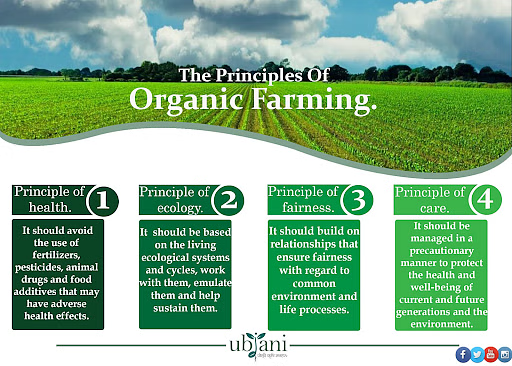
Organic farming principles are essential guidelines that underpin the practice of organic agriculture, focusing on sustainability, environmental stewardship, and the health of ecosystems. These principles are designed to create a farming system that maintains and improves soil fertility, promotes biodiversity, and reduces reliance on synthetic inputs. Understanding and applying organic farming principles is crucial for anyone interested in adopting or promoting sustainable farming practices.

At the heart of organic farming principles is the concept of maintaining and enhancing soil health. Organic farmers prioritize the use of natural methods to enrich the soil, such as composting, green manure, and crop rotation. Composting involves recycling organic materials like plant residues and animal manure into nutrient-rich compost that improves soil structure and fertility. Green manure crops, which are grown specifically to be plowed back into the soil, help to add organic matter and nutrients, further enhancing soil health. Crop rotation, the practice of alternating different crops on the same land, helps to prevent soil depletion and manage soil fertility naturally. These techniques are foundational to organic farming principles, ensuring that the soil remains productive and resilient over time.
Another key component of organic farming principles is the promotion of biodiversity. Organic farming encourages a diverse ecosystem by integrating various crops and creating habitats for beneficial organisms. By avoiding monocultures—where a single crop is grown extensively—organic farmers reduce the risk of pest and disease outbreaks that can occur in homogeneous systems. Instead, they use diverse plantings and companion planting strategies to attract beneficial insects and pollinators, which help to control pests and improve crop yields. The emphasis on biodiversity not only supports the health of the farm ecosystem but also contributes to greater resilience against environmental stresses.
Pest management in organic farming is guided by principles that avoid synthetic pesticides and fertilizers. Organic farmers use a range of natural methods to manage pests, such as introducing beneficial insects that prey on harmful pests, using natural predators, and applying organic-approved pest control solutions. Additionally, physical barriers like row covers and traps can be employed to protect crops from pests. These methods align with organic farming principles by focusing on prevention and creating a balanced ecosystem where pests are naturally controlled, rather than relying on chemical interventions.
Soil fertility and plant nutrition in organic farming are managed through natural means, avoiding synthetic fertilizers. Organic farmers use compost, manure, and organic fertilizers to supply essential nutrients to their crops. These inputs not only provide nutrients but also improve soil structure and microbial activity, which are critical for healthy plant growth. By focusing on natural fertility management, organic farming principles help to build and maintain soil health, support plant vigor, and reduce the risk of nutrient runoff that can lead to environmental pollution.
Water management is another important aspect of organic farming principles. Organic farmers often implement practices such as mulching, which helps to retain soil moisture and reduce water evaporation. They may also use drip irrigation systems to deliver water directly to the plant roots, minimizing water waste and ensuring efficient use of resources. These water conservation strategies align with organic farming principles by promoting sustainable use of water and protecting the health of the soil and surrounding environment.
Organic farming principles also emphasize the importance of reducing environmental impact and promoting sustainability. This includes practices that conserve energy, reduce greenhouse gas emissions, and minimize waste. For example, organic farmers may use renewable energy sources, such as solar or wind power, to reduce reliance on fossil fuels. They also implement waste reduction strategies, such as recycling organic waste and using it as compost or animal feed. By adopting these practices, organic farmers contribute to a more sustainable agricultural system that supports environmental health and reduces the carbon footprint of farming.
In addition to environmental benefits, organic farming principles focus on the health and well-being of consumers. Organic products are grown without the use of synthetic pesticides, herbicides, or genetically modified organisms (GMOs), which can have potential health risks. By adhering to organic farming principles, producers offer consumers food that is free from harmful chemicals and promotes overall health. This commitment to consumer safety and health is a fundamental aspect of organic farming, reflecting the broader goals of organic agriculture.
Overall, the principles of organic farming provide a framework for creating a more sustainable, environmentally friendly, and health-conscious agricultural system. By prioritizing soil health, biodiversity, natural pest management, and sustainable practices, organic farming principles contribute to the well-being of ecosystems, communities, and consumers. As awareness of the benefits of organic farming grows, these principles continue to guide the development of agricultural practices that align with the goals of sustainability and environmental stewardship. Embracing organic farming principles is not only a commitment to better farming practices but also a step toward a more resilient and sustainable food system.









